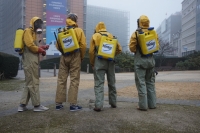“Campaigners and activists are meeting today in Brussels and other cities all across Europe (Madrid, Rome, Berlin and Paris) to launch a European Citizens Initiative (ECI) in order to put pressure on the EU to ban glyphosate, reform the EU pesticide approval process and set mandatory targets to reduce pesticide use in the EU. The main target is to collect at least one million signatures from Europeans and submit the petition before the Commission's next move to renew, withdraw or extend the EU licence of glyphosate. For more information on how to take part in the initiative follow http://www.stopglyphosate.eu/”.
Glyphosate, is the active ingredient of the world’s most commonly used herbicide products. Its European license, which expired on June 2016, received an unusual 18-months extension, a period during which the European Chemical Agency has been asked to deliver its decision on its classification. This unusual action in the authorisation procedure of a pesticide, was the result of a long struggle from civil organisations, scientists and concerned European citizens, against the authorisation of this compound in Europe, which in the beginning of 2016 was going to be renewed for 15 years (until 30th of June 2031!).
This gives us, the European Citizens, an opportunity to act, use the European democratic procedures and demand the ban of this hazardous chemical.
The main reason behind this collective reaction is undoubtedly the conclusion of the International Agency for Research on Cancer (IARC) of the World Health Organisation (WHO) that classified glyphosate as a “probable human carcinogen”. And particularly the fact that few months later the European Commission and the European Food Safety Authority EFSA, concluded that glyphosate “poses no carcinogenic risk for humans” giving the green light for its authorisation in Europe. According to European law (Reg 1107/2009) substances “presumed to have carcinogenic potential for humans” (equivalent to IARC’s classification of “probable human carcinogen”) must not be authorised for use in pesticide products.
Unfortunately, the cancer-potential of glyphosate is only the tip of the iceberg when it comes to this compound. PAN Europe highlights that exposure to glyphosate herbicides has been linked to a wide range of diseases in humans, animals, plants as well as in agricultural crops. In fact, farmers end up using additional pesticides to fight new plant diseases, exposing themselves to mixtures of toxic chemicals, and putting at risk their own health, the health of their families as well as that of unaware bystanders, consumers, the environment and its ecosystems. A summary on the toxic effects of glyphosate and glyphosate-based products is given below.
With ECI we, the European citizens, are calling for the EU to put an end to this pesticide treadmill, put human protection and the environment above private profit and open the path for a pesticide free future in Europe.
Contact: Angeliki Lyssimachou, Environmental Toxicologist, angeliki [at] pan-europe.info, +32 2 318 62 55
